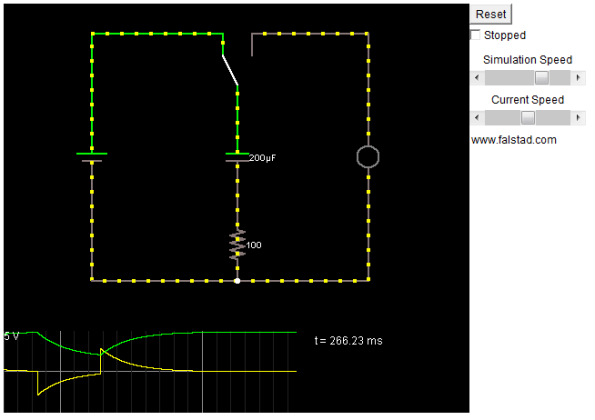Archive
Capacitors
Capacitors are a device used to store an electric charge, consisting of one or more pairs of conductors separated by an insulator. Though they function somewhat similarly to batteries, the main difference is that they are able to charge and discharge very quickly and they can only hold a charge and do not produce it.
To better understand capacitors I built a simple circuit based on the simulation found on falstad.
The circuit is split in two for the charge/discharge phases by a SPDT switch. A battery is hooked up to the capacitor with a resistor, and once the capacitor is charged the switch can be thrown to drive the current to light the LED.
When a capacitor is connected to the battery two things happen:
The plate on the capacitor that attaches to the negative terminal of the battery accepts electrons that the battery is producing.
The plate on the capacitor that attaches to the positive terminal of the battery loses electrons to the battery.
Once it’s charged, the capacitor has the same voltage as the battery (a 9 volt battery will give you 9 volts on the capacitor).
And yes, using a larger capacitor will result brighter and longer lit LED. This capacitor is 5600 μF:
It’s important to note that while the capacitor is charged one direction, it is discharged the opposite direction therefore the LED must be positive side towards the discharging end of the capacitor. This puzzled me the first time I set up the circuit and it didn’t work, but it makes sense if you visualize a capacitor as a pipe with a rubber sheet dividing it in two lengthwise.

While working with large capacitors it is important to discharge them prior to handling, this can be done by shorting both pins. In attempting to discharge a capacitor it is not advisable to use your finger, even though my curious attempts to do so were unsuccessful, varying skin moisture and conductance may cause different results.

More information can be found at:




